“We have to save our country,” 22-year-old Dhruva tells Sky News, as he breaks into slogans with dozens of others supporting presidential candidate Anura Dissanayake.
The atmosphere is charged on the last day of campaigning. The enthusiasm among the young is palpable – they desire change and it is evident.
They want change from the dynastic families that have dominated Sri Lankan politics and ruled the country for decades.
Unlike the other main contenders, Anura Dissanayake is an outsider challenging the status quo. And has caught the people’s imagination.
A resounding applause as he arrives and pays his respects to the Buddhist clergy who have also waited patiently.
“You call on us to fulfil your expectations, your aspirations, your dreams and for our country and we will fulfil it. We are a vote of hope,” he tells the crowd.
The presidential election is a pivotal moment in Sri Lanka’s political and economic history, and is the first electoral process taking place after the protests of 2022 that shook the nation.
As the polls opened on Saturday morning, more than 17 million of Sri Lanka’s 22 million people are eligible to vote.
Dr Jehan Perera, director of the National Peace Council, told Sky News: “This has been a long time coming for many decades.
“Sri Lanka has been spending more than it earned and subsidising consumption, but then came to be a growing culture of impunity and corruption at the highest levels of government and business that led to the economic collapse.
“Sri Lanka didn’t have foreign currency to purchase basic commodities – medicine, petrol, gas and food in short supply. We didn’t have electricity, we had power cuts going on for 12 hours.”
There was anger as the nation and its citizens went bankrupt: large-scale demonstrations went on for days, and pitched battles were fought between protesters and the security forces.
But the rage was so great that nothing withstood the people’s fury.
The Rajapaksa regime that had a stranglehold on the nation’s politics was removed, the government was forced to resign, and its president fled the country.
Citizens stormed his home and even enjoyed a dip in his pool as the police that was meant to secure the premises melted away.
Dr Perera said: “People are disillusioned with mainstream parties and want a complete change. Their main theme is that corruption must end. Those who ran the country for the last 75 years on all sides of the political divide need to go.
“New people who are untainted with corruption, who may not really have governed the country should come in. So it’s a very tense period because there can be a big transition and the direction of the transition is not very clear.”
Sri Lanka is known for its garment industry but it has been struggling to survive since the Easter bombing in 2019. This was compounded by the debt crisis.
Read more from Sky News:
Sky News finds Israeli soldiers pushed at least four bodies off building
Al Fayed ‘cherry picked’ women from Harrods, ex-employee claims
For 42-year-old entrepreneur Priyanga Lankage it has been a very difficult time. He’s had to shut down two of his three garment factories and lay off hundreds of workers as costs escalated and orders declined.
He told Sky News: “Because of civil unrest, political instability and insecurity, the economic climate is not favourable for business. International retail brands not (sic) to place their orders to Sri Lanka. They are going to Bangladesh, Vietnam and other countries.”
An International Monetary Fund bailout package of $2.9bn (£2.1bn) has stabilised the economy and reduced inflation considerably. But it has come at a price with hard austerity measures, structural reforms and tax hikes that have caused a cost of living crisis.
Shopping bag in hand, a woman who gave her first name as Fatima said: “No matter how much people earn, it’s not enough for them to live on. People are living with great difficulty.”
Shantah Fernando, a driver, added: “It’s impossible to live on the salary we get. A few years ago, we survived on a salary for a whole month, now it’s not enough for even seven days.”
And vegetable seller Mohammad Shaheed told Sky News: “We hope for a change, but we don’t know how it will happen.”
According to a World Bank report, food insecurity and malnutrition have increased, poverty doubled, and inequality widened.
Approximately 60% of households experienced a decline in income due to reduced work hours or job losses.
The country is yearning to turn a page. The next president has his work cut out and will need to steer the country out of one of its worst crises since gaining independence.








